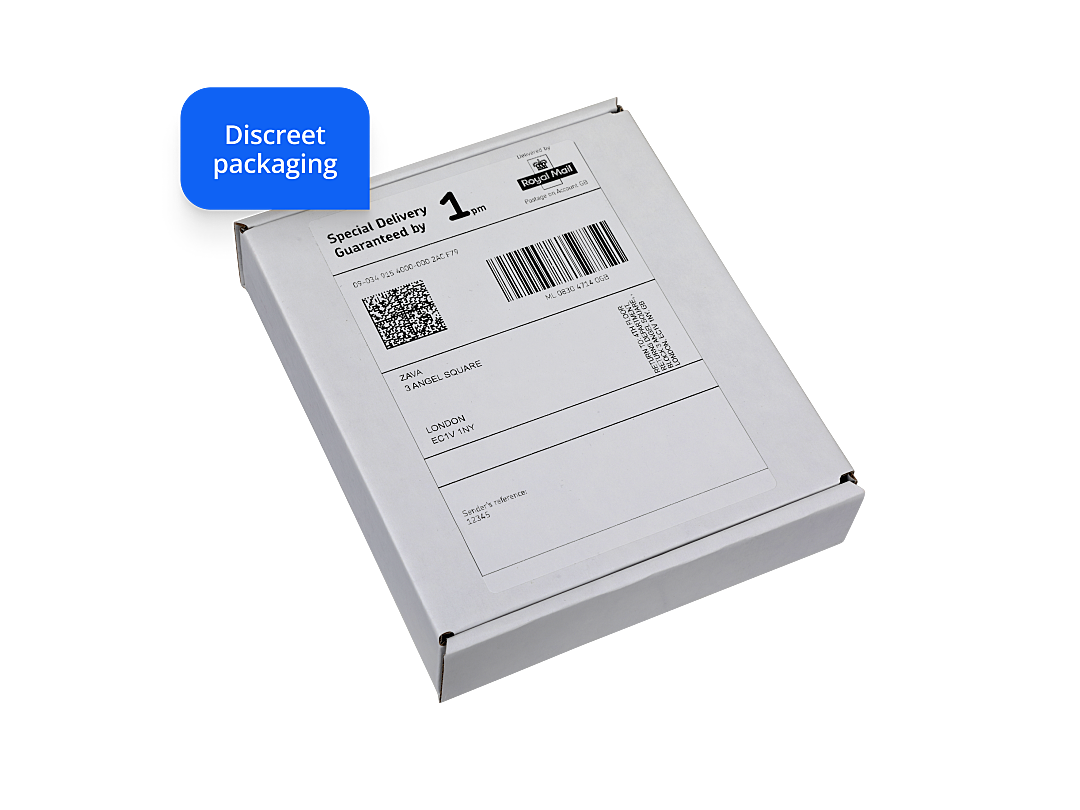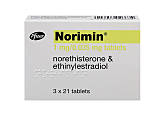-
If you're looking for a contraceptive pill to help with period-related problems then Norimin could be a great choice. Norimin has more oestrogen to help minimise problems like period pain or heavy bleeding, while still giving the same protection against pregnancy.
If you've started Norimin, you can get a repeat prescription online. Simply answer some questions about your medical history so our doctors can check that this is safe for you and select Norimin as your preferred treatment option.
Prices
6 x 21 tablet(s) - £15.99
3 x 21 tablet(s) - £12.99



About Norimin
-
-
Norimin is a type of combined hormonal contraceptive (CHC) known as ‘the pill’, or the combined oral contraceptive pill (COCP).
It contains two active ingredients which are synthetic (man-made) forms of naturally occurring female sex hormones. These are ethinyl estradiol (a synthetic form of oestrogen) and norethisterone (a synthetic form of progesterone).
CHCs such as Norimin prevent the release of an egg from the ovary (ovulation). They change the mucus in the cervix (entrance to the womb) and the lining in the womb which helps make it difficult for sperm to reach an egg, or for an egg to embed itself in the womb lining.
Using CHCs like Norimin usually results in lighter and less painful periods and they can be used for women who have painful periods.
-
-
At ZAVA, we offer Norimin, but not Norimin 28.
Both Norimin and Norimin 28 day contain 21 tablets of the same ingredients (ethinylestradiol and norethisterone), but Norimin 28 day contains 7 extra pills that don’t contain any hormones: these are called placebo pills, and these are to help you remember to take one pill every day.
The most common way to take Norimin tablets is by taking one tablet every day for 21 days, before taking a 7-day break. During this break, you should experience a withdrawal bleed that’s similar to your normal period.
Norimin 28 day tablets are taken for 28 days with no 7-day break. The withdrawal bleed then appears during the 7 days of placebo tablets.
If you have forgotten one pill or more, make sure you read the patient leaflet to have all the information on the appropriate steps to follow or contact your doctor for further advice.
-
-
A common misconception is that contraceptive pills can cause weight gain but there is no proof to support this.
Contraceptives pills can affect acne: whilst some progestogen-only pills might make your acne worse, most combined hormonal contraceptive pills improve acne.
There has been lots of inaccurate news about weight gain with the contraceptive pill, but CHCs such as Norimin have not been shown to cause weight gain or loss. However, some women may find that their weight changes throughout their cycle due to fluid retention.
Some combination pills such as Norimin have been shown to help in the treatment of acne, but they can cause side effects such as rashes, so in some cases if you have acne it can make it worse.
-
-
As long as you don’t have any health problems or other medications that clash with Norimin then it can be a good choice for you. A consultation with a doctor, nurse, or online doctor service will help determine if this is the case.
In addition to the contraceptive effect, there are additional benefits from taking the pill, including:
- lighter periods
- improvement in symptoms of premenstrual syndrome, ie: pain, mood changes, fluid retention
Norimin is very effective at preventing pregnancy and if you experience side effects they are usually mild and do not last. However, there are women who should not take Norimin. For example, you should not take Norimin if you are pregnant. Tell your doctor if you plan to become pregnant or are breastfeeding. Your doctor can discuss the risks and benefits with you.
You might have to consider a different contraceptive if you’re breastfeeding (depending on when you gave birth) as the oestrogen contained in the pill may reduce the amount of milk you produce.
In addition, you shouldn't take Norimin if you have an allergy to:
- Any medicine containing ethinyl estradiol or norethisterone (synthetic oestrogen and progesterone)
- Any other similar medicines (such as other oral contraceptives)
And you shouldn't take Norimin if you have or have had any of the following medical conditions:
- Venous thromboembolism (VTE), which is a blood clot, or if you are on medicines called anticoagulants which are used to "thin the blood"
- Hereditary or an acquired disposition for venous thromboembolism
- Blood clots or a history of blood clots in the:
- Legs (thrombophlebitis or deep vein thrombosis (DVT))
- Lungs (pulmonary embolism)
- Eyes
- Multiple risk factors VTE including obesity, age above 35 years, or smoking
- Major surgery and have been confined to bed for long periods of time
- A blood clot in an artery (arterial thromboembolism (ATE)) or a past history of these that include:
- Stroke
- Angina
- Transient ischaemic attack or "mini stroke"
- Hereditary or an acquired disposition for ATE
- History of migraine, accompanied by blurred vision, difficulty in speaking, muscle weakness, or increased sensitivity to light, sound, or noise
- Multiple risk factors for ATE or a serious risk factor for ATE that. include:
- High blood pressure
- Diabetes with blood vessel damage
- Severe lipid disease
- Sickle cell anaemia
- Disease in any blood vessel(s)
- Inflammation of the pancreas which is associated with very high blood levels of triglycerides (fatty substances)
- Liver disease (including tumours of any type), a history of jaundice (a yellowing of the skin or the whites of the eyes) or another type of jaundice, cholestatic jaundice of pregnancy, or severe generalised itch in the body during pregnancy, Dubin-Johnson Syndrome, or Rotor Syndrome
- Vaginal bleeding with an unknown cause
- Pregnant or suspect that you may be pregnant
- Cancer or suspected cancer of the breast or sex organs (e.g. cervix, vagina, ovaries, endometrium, womb) and known or suspected oestrogen-dependent tumours
- Otosclerosis (an ear disorder) which worsened in past pregnancies
- Medications that may interact with the pill
- Breastfeeding/pregnancy
There are also some medicines that may interfere with the effectiveness of Norimin and vice versa. It is important to speak to you doctor if you are taking any other medicines including any that you have bought from a pharmacy or health food shop. Some of the following medicines can impact on the effectiveness of Norimin, so tell your doctor if you are taking any of the following:
- Rifampicin for the treatment of tuberculosis
- Some medications for treating HIV
- Antifungal agents such as griseofulvin.
- Barbiturates.
- Medicines for epilepsy such as carbamazepine and phenytoin
- Phenylbutazone – a medicine used to relieve symptoms of inflammation, including arthritis
- St John's wort – a herbal remedy that you can buy without a prescription
-
-
Like all medicines, you may experience side effects when taking CHCs, but they should be mild and temporary. There are some serious side effects, which if you experience you should tell your doctor as soon as possible.
Symptoms such as headaches, feeling sick, and mood changes are common and could be caused by a number of reasons. It is important to find out if the side effects that you are experiencing are due to the pill or whether something else maybe causing it. If you experience new symptoms, like headaches or they have increased in frequency, then this could be due to the pill. One way to try and determine the cause of your symptoms, is to keep a diary of when your symptoms occur and how often.
Some side effects including headaches, breast tenderness and nausea are usually temporary, however if they last longer than three months, then speak to your doctor as they may switch you to another contraceptive.
Uncommon side effects (affect 1 in 100 to 1 in 1000 people) include:
- Vomiting and diarrhoea
- A reduction in your sex drive
- Skin conditions, such as eczema
There are some rare or serious side effects which, if you experience, you should tell your doctor or call an ambulance immediately. You should also tell your doctor if you experience an allergic reaction after taking Norimin. These symptoms are rare, but can be severe and you may need urgent medical attention or hospitalisation. They include:
- Sudden wheezing, difficulty in breathing, chest pain, fever, sudden swellings, rash or itching (especially affecting the whole body)
- Coughing up blood
- Swelling or tenderness in your stomach
- Sharp or severe pain in the chest
- Shortness of breath or finding breathing is painful
- Painful or inflamed veins in your legs
- Migraine for the first time (a bad headache with nausea/sickness) or migraines which get worse, especially if your sight is affected, you see flashing lights, or your limbs feel weak
- Sudden and unusual severe headaches
- Dizziness or feeling faint
- Problems with your sight or speech
You may also experience changes to your period as a result of taking Norimin. These can include:
- Mood changes – If your experience mood changes which last longer than three months and are severe, for example feeling depressed or anxious most of the time, then speak to your GP
- Breakthrough bleeding (unexpected vaginal bleeding) – up to one fifth of women experience breakthrough bleeding or spotting, but this usually settles within three months. If it doesn’t, speak to your doctor
Any side effects of medicine including contraception should be reported to the MHRA’s Yellow Card reporting scheme. The MHRA regulates all medicines and the Yellow Card Scheme helps the MHRA monitor the safety of all contraceptives. If you have experienced any side effect, you can report it to MHRA Yellow Card reporting scheme. Informing the MHRA about side effects helps them to get more information about how often side effects occur and helps them identify rare ones.
It’s important that you get a complete information on the different contraceptive methods before you start Norimin, to make sure this pill is the one that best suits you.
If you’re thinking about using contraceptives for a long time, you could consider long-acting reversible contraceptives (LARC). These are contraceptive methods that last for months (like the progesterone injection) or years (like the contraceptive implant or the coil) and give more than 99% protection against pregnancy.
-
-
Common side effects (affect 1 in 10 to 1 in 100 people) that you may experience when taking Norimin include:
- Headaches – if you have headaches, they should improve as time goes on. However, if you still experience headaches and you’ve been taking Norimin for more than three months, or suffer migraines, you should speak to your GP
- Nausea – you may start feeling sick when you first start taking the pill, but the symptoms should improve; if it doesn’t, speak to your GP
- Breast tenderness – this side effect tends to improve a few weeks after starting the pill, but if you suffer from persistent or severe breast pain or find a lump in the breast then speak to your doctor

Dr Laura Joigneau Prieto joined ZAVA in April 2018 as a clinical doctor. She studied medicine at the Universidad Autónoma in Madrid, Spain, and at the Pierre and Marie Curie Faculty in Paris, France. She did a Master’s Degree in clinical medicine in 2009 at the Rey Juan Carlos University in Madrid.
Meet our doctorsLast reviewed: 02 Mar 2019
-
Norimin 1 mg/0.035 mg Tablets, Patient Information Leaflet, EMC [accessed February 2023]
-
Ethinylestradiol with norethisterone, NICE/British National Formulary [accessed February 2023]
-
FSRH Guideline Combined Hormonal Contraception, Faculty of Sexual and Reproductive Healthcare [accessed February 2023]
-
Combined pill, National Health Service [accessed February 2023]
Contraceptive pills are a reliable way of reducing your risk of getting pregnant from sex. ZAVA offers most common brands of pill, so you can order your preferred brand by visiting our contraceptive pill service page.
In stock. Prices from £12.99














